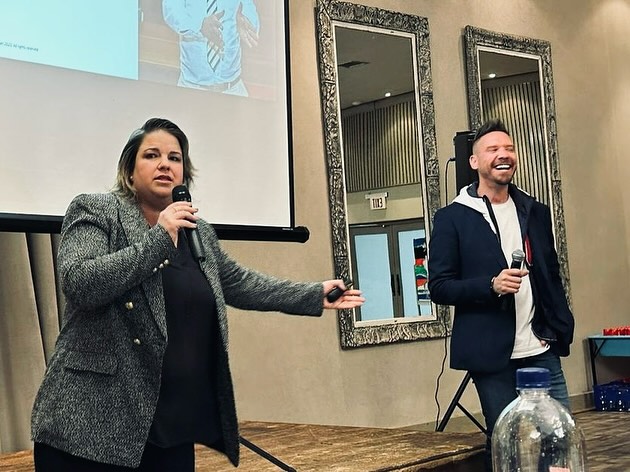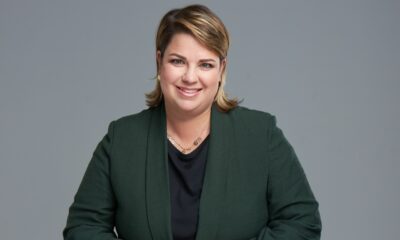
Featured Item

Active citizenship good news story of the day
Corruption, crime, maladministration, economic woes, Eskom – there’s no escaping the negativity that pervades South Africa’s news headlines. Yet, there’s another South African story, one of ordinary people making an extraordinary difference in the country they love.
So said renowned journalist and author, Mandy Wiener, and Good Things Guy founder Brent Lindeque in a joint keynote address at Sydenham Hebrew Preschool in Johannesburg last week. In her weekday 702 radio show, articles, and books, Wiener seeks to bring light to heavy media content, while through his website, goodthingsguy.com, Lindeque works to counter prevailing negativity with stories of hope and inspiration.
Together, they stressed that we need to acknowledge the challenges South Africa faces in order to make a change. “We need to have an understanding of where we are as a country if we’re going to get a full appreciation of what needs to be done to fix it,” said Wiener.
Though she says her job is literally to tell South Africans how bad things are in the country, Wiener also consciously looks to add a dose of positivity. There’s a negativity bias in news reporting that goes back to our inborn survival instinct, but there’s also recognition of the need for light and shade in the media to bring some balance, she said. “People are looking for some kind of reprieve from the negativity,” which is why she chats to Lindeque once a week on her radio show, one of its most popular features.
“When you start to surround yourself with good news, you start to see more good news,” said Lindeque. Yet, though he’s in the job of spreading positive stories, he said having uncomfortable conversations is necessary, pointing out that “hope alone can’t fix what’s broken”.
“We’re in a serious crisis as a country,” said Wiener. Though we’re not a failed state as many argue, things are definitely concerning, she said, referencing slow growth, high unemployment, and widespread corruption and its detrimental economic impact.
In our daily lives, we feel the impact of the rising cost of living coupled with service delivery failures – from potholes to water challenges to electricity. “Loadshedding isn’t just about what it’s doing to our businesses, to the traffic, or cellphone networks,” said Lindeque. “It’s also huge when it comes to our mental health. Loadshedding has been far worse this year than any other years before.” The impact on our state of mind is undeniable.
Yet, he said, “We’re gatvol but not yet despondent.” Wiener agrees. “Though we can’t gloss over the reality of the situation, we’re seeing that South Africans don’t just want to complain. They want to do something; they’re asking how they can make things better. The reality is that the default negative narrative about South Africa isn’t true.
“There are incredible South Africans every day who are changing the narrative of the country,” said Wiener. “These are people who are patriots, who stand up and do the right thing – good civil servants, active citizens, and whistleblowers.” By so often amplifying negative stories, we’re not giving enough attention to the stories about the heroes, the helpers, and the hope-dealers, said Lindeque.
Lindeque’s inbox overflows with good news stories every day – stories of active citizens physically getting involved and making a difference. There’s the story of a senior citizen who fixed more than 50 potholes in his neighbourhood in two months. There’s another about a woman who decided to clean Hennops River, inspired her community to join her, and started a non-profit organisation called Hennops Revival, which recently celebrated removing two million kilograms of trash out of the river.
There are countless stories of such individuals as well as whistleblowers, charitable organisations, and businesses changing their own narrative as well as the narrative of the country, said Wiener. “In every instance where government has failed in South Africa, civil society has stepped into the breach and held the line. Of course, government needs to come to the party too, though, it can’t merely outsource the responsibility of running the country to the private sector and civil society. Public-private partnerships are also key. A combination of these things need to work to make sure that the country functions.”
From challenge comes opportunity, said Wiener. “That’s our can-do spirit as South Africans – people look at the chaos and see opportunity.” We see it through small businesses run by passionate entrepreneurs and in the country’s informal sector, which despite the red tape is making things happen.
Government does get some things right, she said. “Operation Vulindlela, a joint initiative of the presidency and National Treasury, aimed at reducing red tape across government departments, has had successes. We’re also still living in a functional democracy, there isn’t complete anarchy on the streets. We still have one of the most remarkable Constitutions in the world. That’s something that you should be proud of.”
So, what can we do as individuals to change the narrative that surrounds us every day? “You don’t have to take on an enormous project,” said Wiener. “You can have little wins, do things that can create change and also be the catalyst for change.”
Acknowledging that many are contemplating emigration, Wiener said it was a necessary consideration. “We’re not saying that you have to stay here,” she said. “However, if you do choose to stay, then you’ve got to be here and do something about what’s going on.”
Offering practical tools on how to become change agents, Wiener and Lindeque stressed the need to educate yourself about what’s happening around you. Know the contact details of your neighbourhood police chief or area councillor. Consider the news you consume and share. “People tend to seek out that which amplifies their perception, but you’re never going to change your perspective if you continue viewing the world in the same way,” said Wiener.
They also suggested being an advocate, whether by offering your skills or donating to civil groups. Focus on solutions rather than problems, and get others involved.
Wiener stressed the importance of voting, especially in a country where only 25% of eligible South Africans voted in the last election. We may find ourselves in a coalition government at national level in 2024, so every vote truly counts, she said.
Kindness is also key, concluded Lindeque, especially in inspiring active citizenship. He shared a quote from late American TV host Fred Rogers, who said, “When I was a boy and I would see scary things in the news, my mother would say to me, ‘Look for the helpers. You’ll always find people who are helping’.”
This thinking underpins Lindeque’s philosophy. “When the news is at its worst and scariest, I wait an hour or two for that helper to appear, and those are the stories we tell,” he said. “So, how do you make change? If you can’t see a helper, then it’s your responsibility to become one.”








